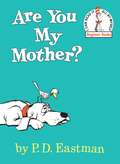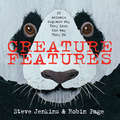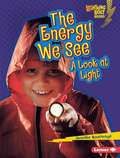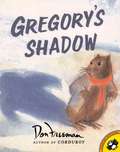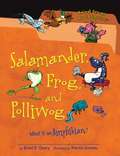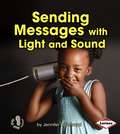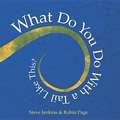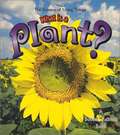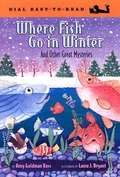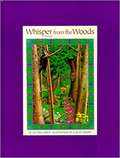Special Collections
District List: BCPS Science - Grade 1
Description: Baltimore City Public Schools Science book list for students in 1st Grade. #bcps
- Table View
- List View
Are You My Mother?
by P. D. EastmanA baby bird goes in search of his mother in this hilarious Beginner Book edited by Dr. Seuss. When a mother bird's egg starts to jump, she hurries off to make sure she has something for her little one to eat. But as soon as she's gone, out pops the baby bird. He immediately sets off to find his mother, but not knowing what she looks like makes it a challenge. The little hatchling is determined to find his mother, even after meeting a kitten, a hen, a dog, and a Snort. The timeless message of the bond between mother and child make P. D. Eastman's Are You My Mother? A must for baby showers, beginning readers, and Mother's Day.
Originally created by Dr. Seuss, Beginner Books encourage children to read all by themselves, with simple words and illustrations that give clues to their meaning.
[This text is listed as an example that meets Common Core Standards in English language arts for K-1 at http://www.corestandards.org.]
Images and descriptions available.
Creature Features
by Steve Jenkins and Robin PageDear axolotl: Why do you have feathers growing out of your head? Axolotl: They aren't feathers—they're gills! They let me breathe underwater. Let's face it. Even as babies, we humans pay close attention to faces. Observing another person's features and expressions tells us whether they are happy, angry, excited, or sad. And when we look at an animal, it's hard not to imagine that its face is communicating human feelings. This isn't true, of course. Squinty eyes, an upturned mouth, or another odd expression is probably there because, in some way, it helps that animal survive. Packed with many cool facts and visuals on where certain animals live and what they eat, this book captures twenty-five humorous—and very true—explanations of why animals look the way they do in order to exist in this world.
The Energy We See
by Jennifer BoothroydLight shines through your kitchen window. A campfire brightens the dark woods. You see light all around you. But where does most light come from? And how does it travel? Read this book to find out! Learn all about matter.
Gregory's Shadow
by Don FreemanGregory is a shy groundhog, and having his friend Shadow close by makes him feel brave. But one day Gregory and Shadow go outside to look for food, and they get separated. Scared and lonely, they search and search for one another. To make matters worse, tomorrow is Groundhog Day, and everyone will be waiting to see if Gregory and his shadow leave their home together. Will the two friends find each other in time for Groundhog Day?
Oscar and the Bat
by Geoff WaringStart with Science books introduce kids to core science concepts through engaging stories, fresh illustrations, and supplemental activities.When Oscar hears a blackbird singing in the meadow, Bat swoops in to talk to him about sound. A sudden thunderstorm and a visiting cow give Oscar lots of opportunities to learn about sounds that are loud or soft, near or far, deep or high.
Salamander Frog and Polliwog What Is an Amphibian
by Brian ClearyThis book introduces the child to various amphibians, their anatomy and their habitat.
Sending Messages with Light and Sound
by Jennifer BoothroydYoung readers will learn how we send and receive messages using light and sound in this accessible, photo-filled book. Simple text explains different methods of sending messages and shows how light and sound make sending these messages possible. Vibrant photos bring basic science concepts to life and encourage kids to explore light and sound on their own.
Sounds All Around
by Wendy PfefferSounds are all around us. Clap your hands, snap your fingers: You’re making sounds. Read and find out how people and animals use different kinds of sounds to communicate. With colorful illustrations from Anna Chernyshova and engaging text from Wendy Pfeffer, Sounds All Around is a fascinating look into how sound works!
Featuring rich vocabulary bolded throughout the text, this brand-new edition of a 1999 title includes brand-new illustrations by Anna Chernyshova. This book also includes a Find Out More section with additional and updated experiments, such as finding out how sound travels through water. Both the text and the artwork were vetted by Dr. Agnieszka Roginska, Professor of Music Technology at NYU.
This is a Level 1 Let’s-Read-and-Find-Out, which means the book explores introductory concepts perfect for children in the primary grades and supports the Common Core Learning Standards, Next Generation Science Standards, and the Science, Technology, Engineering, and Math (STEM) standards. Let’s-Read-and-Find-Out Science is the winner of the American Association for the Advancement of Science/Subaru Science Books & Films Prize for Outstanding Science Series.
Sunshine Makes the Seasons
by Franklyn M. Branley and Giulio MaestroNow reillustrated with colorful, kid-friendly art, this book explains to young readers how the sun makes the seasons and how its light affects life on the earth for all living things. Image descriptions present.
The Very Lonely Firefly
by Eric CarleA lonely firefly goes out into the night searching for other fireflies. Will he find others? A beautiful book from the author of "The Very Hungry Caterpillar," who says about this book: The Very Lonely Firefly is about belonging. We all want to belong to a group, a family, our own fellow creatures. Picture descriptions have been included. This file should make an excellent embossed braille copy.
What Do You Do With a Tail Like This?
by Steve JenkinsA nose for digging? Ears for seeing? Eyes that squirt blood? Explore the many amazing things animals can do with their ears, eyes, mouths, noses, feet, and tails in this beautifully illustrated interactive guessing book by Steve Jenkins and Robin Page.
Winner of the Caldecott Honor
What Is A Plant?
by Bobbie KalmanPlants provide people and animals with food, shelter, and even oxygen. Plants help us live and grow, but how does a plant grow? Where do plants grow? What is a Plant? introduces young readers to a variety of plant types, including ferns, carnivorous plants, mosses, and trees. This fact-filled book explains:-photosynthesis-different methods of reproduction-how seeds germinate and grow-which types of plants grow in different climates-how plants defend themselves
What Makes Day and Night
by Franklyn M. Branley"What Makes Day and Night" goes through the cycle of the earth and its revolutions around the sun.
Where Fish Go in Winter and Other Great Mysteries
by Amy Goldman KossA delightful collection of poems which answer such questions as: "Do Islands float?" and "Why do birds fly?" A creative way to sneak some sound science into young minds. A scan-quality braille version should be quite readable.
Whisper from the Woods
by Victoria WirthA poetic portrayal of the cycle of life of a forest as they share thoughts and wisdom over the years
